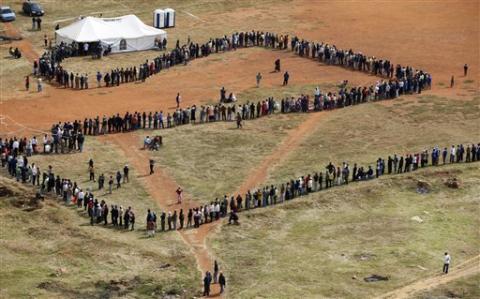Electoral processes in Africa: a vehicle for democratisation or for instability?

Practical information
Themes and regions
Related centers and programs
This is a private event.
Learn more about our corporate support packagesAround
Nicholas Cheeseman
Researcher at the Center for African Studies at Oxford
Mathieu Merino
Researcher CEAN-CREPAO, Policy Officer for Electoral Observation Mission
Gilles Yabi
Director of the International Crisis Group office in Dakar
Presidency
Alain Antil and Vincent Darracq
Responsible for the African Programme at Ifri / Invited Researcher at Ifri (TAPIR Programme)
The dynamics noticed in Africa in the early 90"s had led some observers to announce a "wave of democratisation" on the continent that would lead to the introduction of political pluralism and the organisation of competitive elections. Nearly 20 years later, elections have emerged as the legitimate procedure of political competition and the democratic vocabulary is now widely shared by a majority of African leaders and regional institutions. The international community has contributed to the spread of democratic standard by requesting and often financing the organisation of elections in Africa.
However, despite occasional successes, we can now question whether African elections truly are a vehicle for democratisation, notably when these elections are flawed and primordially serve to legitimize semi-authoritarian powers, or generate political violence. Recent events have taught us that electoral processes often do not meet the democratic expectations. Furthermore, these elections are sometimes used by political actors as a demonstration of strength before a negotiation of unstable governments (the last elections in Kenya and Zimbabwe). Lastly, elections can also and often generate crisis, as evidenced by the current Ivorian situation.
Contact and informations : Victor Magnani - 01 40 61 60 88 / [email protected]
Partenaire média :
Related Subjects
Other events

From Ambition to Action: Exploring Technological Partnerships with India
The 16th EU-India Summit, held on January 27th in New Delhi with European leaders António Costa, Ursula von der Leyen, and Prime Minister Narendra Modi, marks a significant milestone in deepening EU-India relations. At the same time, official bilateral visits from EU member states are on the rise, including that of the French President, who visited India in February to participate in the Artificial Intelligence Summit. As India asserts its technological ambitions and seeks to reduce its dependence on China, Europe is stepping up its efforts to diversify its strategic partnerships.

The Enlargement of the European Union: A Strategic Choice? France, the Western Balkans and the EU in an Uncertain Geopolitical Context
Russia’s war against Ukraine has brought the enlargement of the European Union back to the centre of European strategic debates. In this context, the Western Balkans have regained heightened visibility in discussions on the continent’s security, at a time when the international environment is marked by a growing number of destabilising factors.






